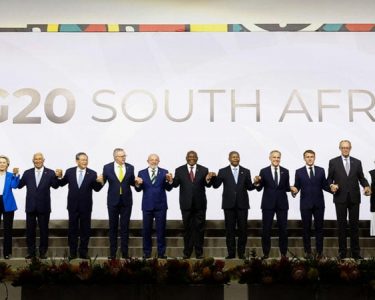SEOUL, Jul 5 (NNN-YONHAP) – Two South Korean media outlets said, Japan inked a “black deal” with the International Atomic Energy Agency (IAEA), to “redact” the sensitive issues of IAEA final report on Japan’s planned discharge of radioactive wastewater into the Pacific Ocean.
The Tamsa and The Mindlenews held a joint press conference with foreign correspondents, saying that, the obtained documents supported allegations that the Japanese government provided the IAEA with at least one million euros, to earn a draft of the IAEA final report, ahead of its official delivery, and demanded it be redacted in sensitive parts.
From an anonymous informant last month, the South Korean media received a transcript of the May 30 conversation, estimated to be made between an unnamed Japanese foreign ministry official and Asakawa, whom the investigative media believed to be the Asian Development Bank (ADB) president.
The transcript showed that Japan made a “political contribution,” of at least one million euros, to the IAEA for their better relationship, while the IAEA already met Japan’s demand to mention the international safety standards, approved by 176 countries, in the report.
Park Dae-yong, a journalist of The Tamsa, told the press conference that, Japan’s foreign ministry denied the conversation just a day after reporting on it, saying, his media received another important tip-off right after Japan’s denial.
An anonymous source under the pseudonym “Jorseti” emailed the media to say that, a lot of details in the transcript are “consistent with what I know” such as the “political contribution.”
Jorseti, reportedly identified as one of the Japanese foreign ministry officials, even sent to the media the snap shots looking like a cover page and the table of contents for the draft IAEA final report, which the source said, the IAEA had secretly delivered to the Japanese foreign ministry.
In dealing with the draft report, Japan demanded a large number of modifications, such as changing “contaminated water” into “treated water,” removing the word “radiation” from the “radiation exposure of ALPS treated water,” and adding that, the organically bound tritium (OBT) “has never been observed in 83 fish monitoring samples,” according to Jorseti.
Park said, it was inappropriate for the IAEA, which was verifying the release of the nuclear wastewater from the crippled Fukushima Daiichi nuclear power plant, to receive funds through an unofficial channel from the Japanese government, which was being verified.
He strongly noted that the IAEA final report, prepared for money, was questionable in credibility.
A document, estimated to be an internal IAEA report dated Jun 1, was emailed by another unidentified informant to the South Korean media, raising the reliability of their previous reports.
“After the IAEA’s consultation with the Government of Japan (GOJ), data and results that could be viewed negatively by the public should be removed,” the document said.
The internal report showed that two IAEA officials visited Japan on May 22, and provided the draft of the final report to the Japanese government, which “recommended to mention the IAEA’s International Safety Standards,” approved by 176 countries, in the report.
“Additional budget of one million euros should be provided by the GOJ, since 850,000 euros provided before has been used up,” the document said, supporting the media’s previous reports of at least one million euros offered by Japan to the IAEA.
The Tamsa journalist, Kang Jin-koo, urged the Japanese government and the IAEA to sincerely explain the allegations rather than ask the media to identify the informant.– NNN-YONHAP





